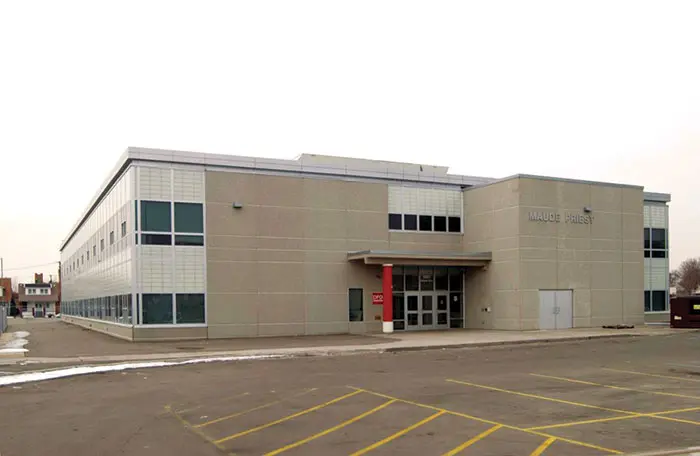
|
| Priest Elementary-Middle School. |
DETROIT — The Detroit Public Schools System appears to be embracing its growing Arab immigration population with a series of upcoming programs and initiatives aimed at impacting the community’s educational needs in coming years.
Among the programs include an Arab Dual Language Immersion initiative aimed at teaching bilingual students in Arabic for half the day and in English for the remaining half.
Another program, titled the Over-age ELL (English Language Learner) Classroom, targets middle school students who are unable to get into high school because they don’t meet the required language credentials.
The third program, in conjunction with Mayor Mike Duggan’s office, seeks to assist children of refugee families by placing them in schools that are equipped with educational and supportive services.
Steven Wasko, executive director of enrollment at Detroit Public Schools, told the AANews that the new programs are a reflection of the diverse community the district serves.
“The district has had great success in identifying new programs to achieve student success,” Wasko said. “We’ve been able to zero down the particular needs of the diverse communities of the city so that we can serve the families better.”
Wasko said the Arab Dual Language Immersion program will be modeled after a successful program offered in Southwest Detroit schools, where students partake in a Spanish-English oriented education. The Arabic-English program will be taught by Arabic-speaking instructors. The district has been working closely with ACCESS to implement the program, one that wouldn’t be found anywhere else in the state.
Wasko said there are already several charter and public schools in Dearborn that offer Arabic in a single classroom, but none of them partake in Arabic-speaking curricula for a great portion of the day.
The district is aiming to launch the program either this coming fall or the autumn of 2017, depending on when resources are ready.
“We believe we would have the only such program,” Wasko said. “It can be a draw not only for Detroit residents, but families in the nearing suburbs who are seeking a program like this in the public or charter schools.”
The district hopes to launch the program with two classrooms of 30 students at each school location. It’s aiming to have the program available at two different sites during its first year. As many as 120 students could participate in the program during its kick-off year.
The district also plans to phase in a cultural calendar that would accommodate students during religious holidays and introduce a nutritional menu that would phase in halal food at specified schools.
Wasko said the district’s Over-age ELL program aims to assist students who have “fallen by the wayside” and are unable to get into a high school because they don’t meet the language credentials.
The program will be launched at Priest Elementary-Middle School, with the support of staff and the community. The district already has more than 25 students who could benefit from the initiative.
The students in the program will learn the necessary listening, speaking, reading and writing skills that would allow them to effectively communicate with their English-speaking peers.
“This is a very innovative program and it could spread to other schools,” Wasko said. “We are very excited about that.”
The district has also identified four Detroit Schools that would be able to host a groundbreaking refugee settlement program – Priest Elementary, Munger Elementary, Gardner Union and Greenfield Union Elementary.
The district is currently working with the director of the Immigrant Affairs office to equip refugee families with proper resources when settling in the city.
The district is also planning to model the program after a successful refugee settlement program in Cleveland that was integrated into its public school system.
According to Wasko, the initiative is ideal for Detroit’s economy and would help reverse its dwindling population.
The program works with numerous agencies, including land banks, to settle refugees in housing projects in Detroit’s neighborhoods and provide children with an education at local schools.
Wasko noted that the district’s initiatives wouldn’t be possible without the contribution of the community and local organizations.
“We really want this to be a partnership,” he said. “We could not step forward and be successful without a very rich and robust community helping our efforts.”






Leave a Reply